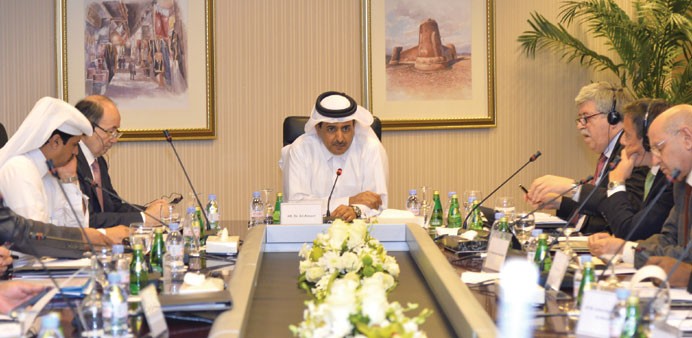Dr al-Marri heading the meeting yesterday. The meeting is attended by representatives of 24 countries and international organisations. PICTURE: Noushad Thekkayil
Voting on the nomination will take place in a general assembly of IAACA in St Petersburg on October 31
By Ayman Adly
Staff Reporter
A total of 24 countries and world organisations have nominated Qatar to head the International Association of Anti-Corruption Authorities (IAACA), it was announced at the IAACA executive committee meeting in Doha yesterday.
“Qatar has received a strong backing due to its efforts in combating corruption in all its forms whether locally or globally,” Dr Ali bin Fetais al-Marri, the Attorney General of Qatar and UN special advocate for stolen asset recovery, stated yesterday.
Voting on the nomination will take place in a general assembly of IAACA in St Petersburg, Russia, where its 146 member states will meet on October 31.
Currently, China is the president of IAACA whose headquarters is in Beijing. When Qatar is elected to head the association, all the meetings and works will be based in Doha.
“Dr al-Marri has been supportive of the work of the association,” said Ye Feng, IAACA secretary general, in a speech read during the meeting by Dimitri Vlassis, chief of the United Nations Office on Drugs and Crime (UNODC), Corruption and Economic Crime Branch, Vienna.
“Dr al-Marri is actively involved in the events of the association; especially every time when the association encountered difficulties, he would be the first to lend a hand,” Feng recalled.
The countries that attended the meeting yesterday included Argentina, China, Brazil, France, Hong Kong, Malaysia, Morocco, Namibia, South Africa, Spain and Ukraine, besides representatives from UNODC and other related world organisations.
Qatar was first elected as a member of IAACA executive committee. Dr al-Marri was nominated to preside over the upcoming meeting in October because of his great efforts in the field.
“Qatar is always ready to co-operate in the field of combating corruption,” stressed Dr al-Marri. “HH the Emir Sheikh Tamim bin Hamad al-Thani has always been supporting all the efforts in this respect and extended support for all the countries that need help in this field.”
He pointed out that corruption is a main impediment for development efforts anywhere in the world, in particular in the poor countries. Accordingly, the Rule of Law and Anti-Corruption Centre has recently helped to establish a similar independent centre in Dakar, Senegal, which is supported by Qatar technically and financially to address corruption issues and train legal officials of the West Africa region.
Dr al-Marri believes there is always a connection between the lack of education and the high levels of corruption. So, the Rule of Law and Anti-Corruption Centre has established a new study course at Qatar University to teach combating corruption.
A similar course was introduced at the University of Jordan and there are talks to establish the same at Paris and Geneva Universities.
Dr al-Marri stressed the importance of the IAACA executive committee meeting, especially since it comes ahead of the sixth session of the Conference of the States Parties to the United Nations Convention against Corruption in November in St Petersburg.

